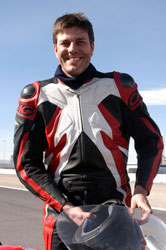 |
| Editor
'arris was all smiles, until the legs turned gimpy. |
It was painful. A whole day
with the Las Vegas Motor Speedway at my disposal, a brand new CBR600RR
just begging for a thrashing, and my lardy arse decides its not going
to co-operate! Well, my quad muscles, to be more precise.
Three months of winter and
a lanky disposition meant that after a day of forced knee-out track
riding at the Freddie Spencer School the day prior would have my muscles
going from sore to painful. A couple of sessions the next day was enough
to put them into spasm mode—usually just at the apex of the lavish
180 degrees of corner two.
It was no good. Although
I managed a grand total of three half-sessions, it wasn’t enough
to get beyond familiarity and into the real tofu of bike testing.
How could life be so cruel?
Well, all is not lost as
the ever-gracious Steve Bond has stepped up to the CMG plate and agreed
to fill you in on the track element at the end of this piece.
For now let’s take a
gander at the knowledge yielded from the on-road portion of the event
(and a few laps on the track), specifically on how it compares to the
CBR600F4i.
TRACK AND ROAD BALANCE
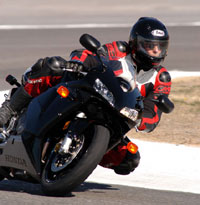 |
| Sliding
around like a 17 year old. |
The first problem I expected
with the compact RR was that of just being able to fit on it. Once again,
I'm 6'4", so it's always a potential problem when it comes to getting
on—and staying on—a modern sportbike. Although the bars are
now located under the upper triple clamp and the rider is 70mm closer
to the tank, it's not too bad overall. The setup is great for the track,
allowing the rider to slide all over the bike in a manner usually reserved
for athletic 17-year-olds with a tub of baby oil.
On the road, the snugness
is more noticeable, but a well designed fairing bubble allows for a
non-turbulent flow of air over the top and against the rider's chest.
I didn't have long enough with the bike to notice the speed required
to get this supportive blast working, but a day blasting through the
desert outside of Las Vegas only left my wrists (and arse) slightly
sore—a very good sign when you consider I can only last about half
an hour on most other supersports.
Still, swapping with Mr.
Bond for a stint on the F4i highlighted its more generous ergonomics,
but also its buzzier nature at the bars. You’d think that would
be more of a problem with the higher tuned bike, but no.
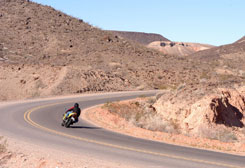 |
| "Howwwwlllllllllllllllllllllllllllllllllllll" |
One of the most noticeable things
about riding the RR is its motor. Honda claim that by raising the upper
rev limit of the bike (redline is 15,000rpm—indicated by a little
light on the tach), they can lower the overall gearing. This allows more
of the power generated by revs to be accessed at slower speeds, however
it also means that you constantly feel that you should be in a higher
gear as you're revving the thing too much. In top, 70 mph would equate
to 6000 rpm and I would find myself searching for the non-existent overdrive
so that I could cruise more gently through the cop-infested Nevada State
parks.
Of course, this isn't even
noticeable on the track. The overall effect is that it has more midrange
than any other 600 sportbike I've ridden, making it a much more usable
tool on both the track and road—once you get used to howling it
higher rev everywhere.
On one particularly straight
stretch of desert highway, I pulled the RR to a stop and then just revved
the knackers off it through the gears. Apart from noticing how much
I enjoy doing this, there were some evident surges in the ultra-smooth
power delivery. Off idle it’s your usual woolly 600 response until
around 4,000 where it starts to pull. Then there's a noticeable surge
around 7,000, another around 10,000, pulling strong and smooth all the
way to the 15,000 redline.
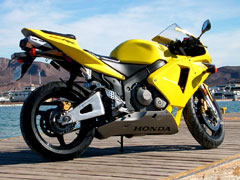 |
| Sexy
lines from any angle. |
Max power (a claimed 115hp)
hits at 13,000. For the next 2,000rpm it’s seemingly flat, dropping
off for the last 500 rpm before hitting the rev limiter, giving quite
a generous over-rev capability for those amongst us who don’t know
when to, or simply refuse to, change.
One thing I haven’t
mentioned is just how quickly it spins up—making the F4i feel like
someone’s just filled the crank with 10 grade treacle. It’s
also testament to a glitch-less fuel injection system.
The box is also worthy of
note as it’s so smooth you don’t really need the clutch during
upshifts. And while I’m on a roll of fitting in information that
I can’t fit anywhere else—the longer swingarm and taller first
gear make it less wheelie prone. Whether that’s a good thing or
not is dependant on how much you like wheelies, I guess. But if you’re
a serious track rider more power with less wheelies helps enormously
when it comes to keeping track times down.
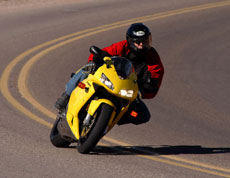 |
| Put
track theory onto the road. |
Uh oh, is that a white car parked
up ahead? Oh look, rolling stoppies!
And what a convenient segue
that gives me.
Front stoppers are a bit
up from the F4i, with larger 310mm twin discs. However, Honda have opted
to not go with the latest trick radial brakes (or USD forks for that
matter), claiming that the RR simply doesn’t need them. Maybe it
doesn’t. Front brakes have bags of feel, but also require a good
hard squeeze if you’re, oh, coming down the home straight watching
the tach rather than your brake markers? Bit scary, that one.
Still, I prefer range and
feel over the on/off stoppers that some manufacturers like to fit—even
if it does mean some faith and determination to get the back end up
and the stoppies rolling. Back brake? Didn’t notice it. If you
lock up the rear or find that it does nothing when you need it most,
you notice it. So that’s good then.
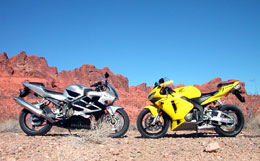 |
| F4i
(left) and RR (right) face off in the desert. |
Handling is fine. I know
that sounds bad and it’s not meant to be, it’s
just that there was such a hoohar about the mass centralization thing
that I was expecting it to ride itself and then hand you a lit cigarette
afterwards. Having said that, it did everything I wanted to and allowed
me to totally focus on my line/cramping muscles on the track. It is
better then the F4i, but not night and day, in my humble average-Joe
viewpoint—although the more race-experienced Bondo seems quite
convinced. Actually, I’m not sure that night and day would be possible
as the F4i’s still a fine handling motorcycle.
There was one scary moment
on the road trip when we hit a series of grievous ripples that would
not have been out of place on Joan Rivers. The RR’s bars were ripped
from my hands, wiggled side to side for what seemed like hours, straightened
up again and then carried on as if nothing had happened - and my pants
were still clean.
This also highlighted the
fact that the suspension is a tad on the hard side. But that’s
okay because Honda claim it to be track focused first, and there the
suspension is about as close to perfect as I could ask for. Did I mention
the super-sexy braced swingarm? I guess I just did.
MOMENTS
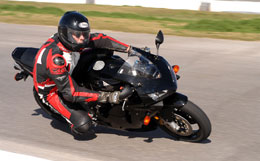 |
| Moment
#1. Well maybe just before as I still haven't removed the antigravity
pucks at this point. |
I can’t finish this piece
without sharing the two "moments" of the ride. The first was
on the track—trying to push through the pain barrier on the never
ending corner two. It was all perfect—the line, the body position,
speed and attitude. My right knee kissed the asphalt and licked its way
around the whole corner in a perfect arc. That’s a first for me—I
simply can’t quite get into the right position. It was almost better
than sex (note: if anything’s better than sex, then you’re not
good at sex…although that position thing can still be a problem!).
Moment two was ploughing
off a snow-covered mountain down a perfectly straight road into the
bowl of the desert below. Tucked in at 160 mph, 14,000rpm in fifth with
the howl of the righteous bellowing out the back and a clear view of
any potential danger ahead. Simple, but rare. It’s the kinda thing
that the RR excels at, and the more I rode it the more I liked it.
If only Honda could get that
lit cigarette thing sussed.
SECOND VIEW – by Steve
Bond
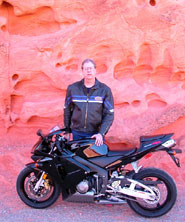 |
| Bondo
trying to forget memories of airline incidents. |
For me, Honda Canada’s
press launch of the all-new CBR600RR started off rather um...shitty.
En route to Las Vegas, Toronto
Sun columnist Philip Lee-Shanok and I were sitting together, three rows
from the back of the plane when I suddenly got a whiff of something.
I thought the older gentleman
standing in the aisle had cut the cheese, but the odor soon became bad
enough that I actually started to gag. I leaned over towards Phil.
"Hey Phil, it smells
like this guy crapped his drawers." The stench suddenly slapped
him across the face like a wet fish.
"Dude, that’s awful."
What I’d originally
thought to be a natural (albeit poorly-timed) bodily function degraded
into a major compromise of his bowel integrity, leaving a trail of putrescence
starting three inches to the right of my size elevens, all the way to
the restroom.
What are the odds of this
happening to anyone but me? When a supermodel takes her top off guaranteed
I’ll be getting a beer or have my back turned. Some guy draws mud
on a transcontinental flight and it’s almost in my lap. Sheesh.
SWEET SMELL OF THE TRACK
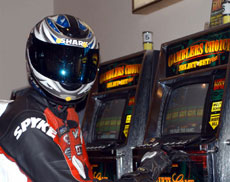 |
| They're
everywhere - motorcycle journalists AND slot machines. |
Monday we did the Freddie Spencer
School and that’s a story in itself. I hadn’t been on a track
since I threw my SV650 racebike down the road last September. It felt
good to drag a knee again.
Tuesday, we got our first
look at Honda’s CBR600RR. It definitely brings a lot to the 600
supersport party. Sit on the saddle and the mass centralization concept
is obvious once you wiggle the bike back and forth (damn, forgot
the wiggle test – 'arris).
The revolutionary Unit ProLink
rear suspension is more than just technology for technology’s sake.
There are tangible benefits that surface both on the track and street.
Under hard acceleration the
rear of the 600RR squats less than a conventional linkage, which is
good. When the rear squats, the front extends and you’re basically
trying to steer a chopper. You then have to muscle the bike around or
roll off to make the corner, and neither option is ideal. To compensate
for rear squat, you add preload which can raise the rear too high or
make it too stiff.
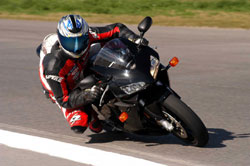 |
| Confidence
is a beefy front fork! |
At the end of the day, the
Michelin Pilot's were shagged and I noticed that when the rear slid,
none of the suspension energy was transferred through the frame to unsettle
the front. It just steered where it was pointed, while the rear slithered
away by itself.
During my first session,
I flicked it in on a fast left and promptly clipped the inside curb.
Man, this thing steers quickly! On most bikes, careening off the curb
at that speed would have launched me into the dirt, but the RR gave
one little twitch and settled back down.
The front forks are a beefy
45mm—no other motorcycle has given me as much confidence in the
front end as the CBR600RR. After personal instruction from Mr. Spencer,
I felt quite comfortable pushing the front harder than I ever have before
and the bike steered precisely with wonderful feedback.
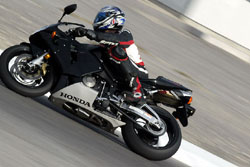 |
| No
more pipe touching. |
A stock F4i has ground clearance
issues on the track. The peg feelers drag quite easily, the exhaust canister
touches next with the handlebar ends following shortly after. The RR’s
pipe is tucked way up under the seat and I suspect the pegs are slightly
higher and narrower, although I can’t confirm that. I touched the
right peg feeler down once or twice, but that was about it.
The RR’s 310mm front
brakes have a stronger initial bite than the F4i's and require a firmer
pull to maximize their effort. Feedback is exceptional.
The compact motor is a jewel,
pulling strongly to the stratospheric 15,000 rpm redline, although maximum
power is developed at 13 and change. The extra 2,000 rpm "overrun"
is there so racers won’t have to upshift when exiting a corner,
which could unsettle the chassis. Throttle response is seamless and
the two-stage fuel injection is completely transparent to the rider—i.e.
you don’t feel where it cuts in.
The CBR600RR is the sharpest
focused Honda yet. It calls the racetrack home, but it likes to visit
the street as well. During a full day over Nevada highways, Editor ‘arris
and I teamed up and swapped an RR back and forth with an F4i. The F4i’s
riding position is cushier and the suspension more plush. The RR seems
more taught, more poised and the ride is firm (bordering on harsh sometimes),
especially over bumpy pavement.
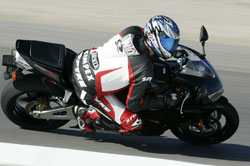 |
| Falling
in love with the RR? |
The RR has major midrange,
and during some impromptu 100 km/h roll-ons, it slowly pulled away from
the F4i in fourth and fifth. In top gear the RR left the F4i for dead.
Nevada’s generous 75 mph (125 km/h) limit made for 85-90 mph (140-150km/h)
cruising without worrying about the gendarme, which is fortunate as
both bikes gave a wonderful view of mon elbows.
From bleak desert to 9,200
feet mountain passes (complete with snow and ice), the fuel injection
worked flawlessly on both bikes. The RR’s handlebars are below
the triple clamps and the seating position is sportier than the F4i.
Larger members of our group found the RR less extreme than other extreme
sportbikes while those smaller in stature thought it more severe. Strange,
no?
If I had to choose? Geez…tough
call.
Probably the RR. The sportier
riding position and lack of underseat storage are more than offset by
the willing engine, taut chassis and great overall package. It raises
the 600 Supersport bar another notch—a big ‘un.
Dealers will be able to special
order race kits, but at press time. We don’t know what’s in
the kit or pricing.
|